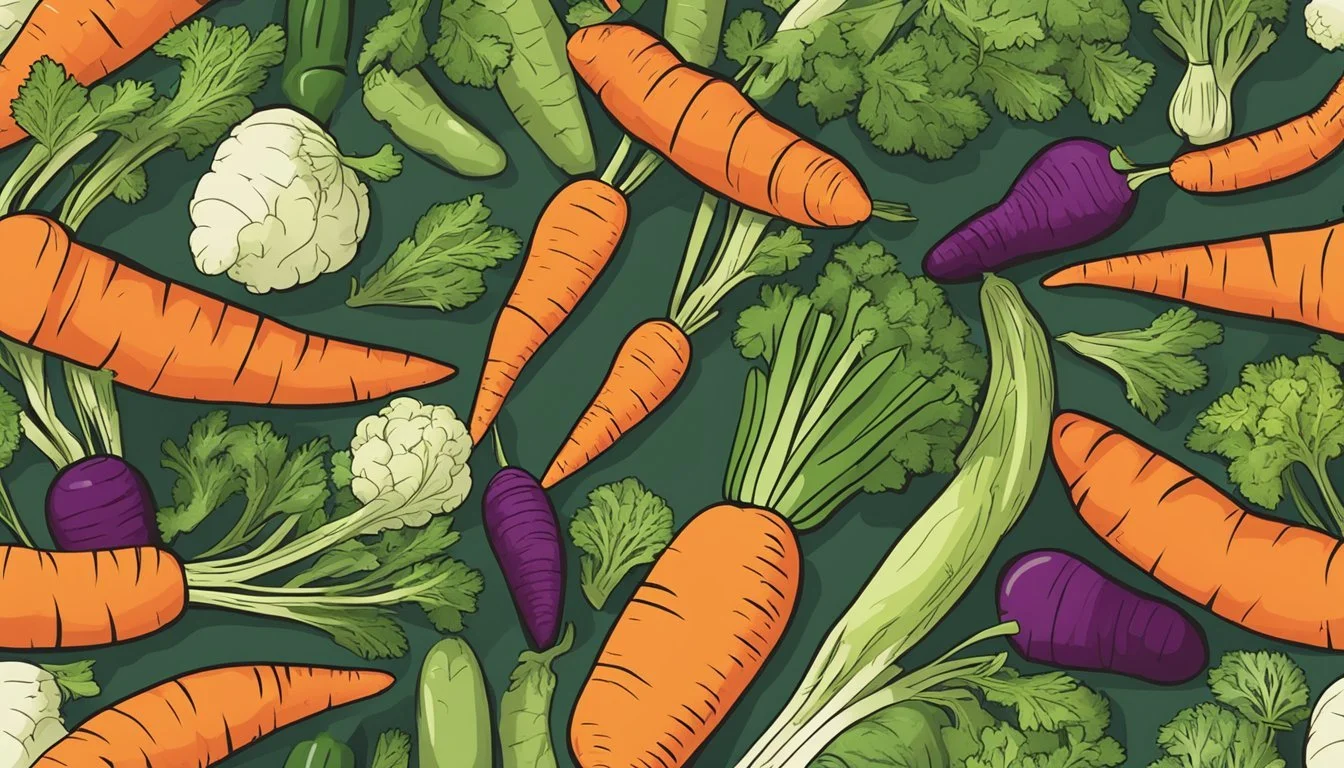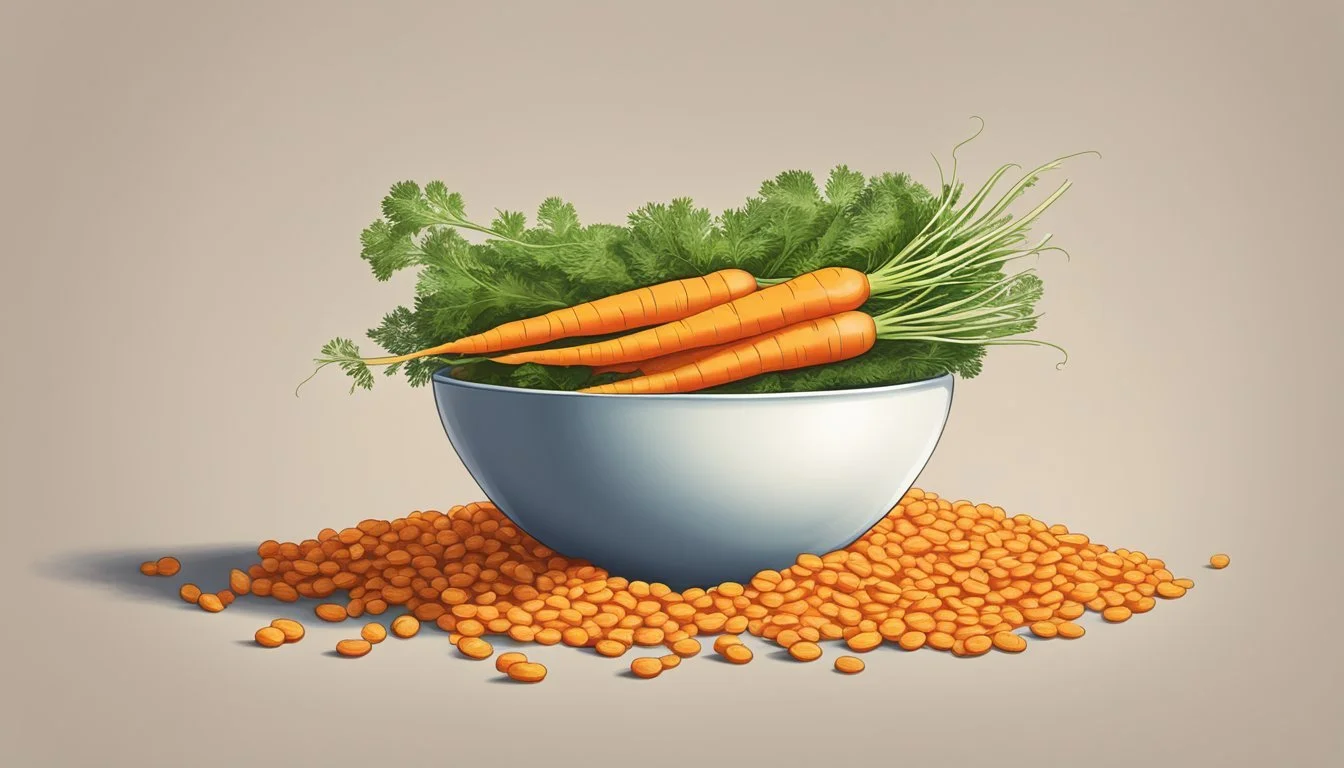How Many Carrots Per Day Is Too Much?
Understanding Safe Intake Limits
Carrots are a highly nutritious addition to a balanced diet, offering an array of health benefits primarily due to their rich content of beta-carotene, fiber, vitamins, and antioxidants. These benefits range from improved vision to enhanced digestive health. They are low in calories yet high in valuable nutrients, making them a preferred snack for many health-conscious individuals.
However, moderation is key in the consumption of any food, including carrots. The body converts beta-carotene into vitamin A, an essential nutrient for many bodily functions, but excessive intake can lead to carotenemia, a condition where the skin takes on a yellowish hue due to high levels of carotene in the blood. While this condition is not harmful, it indicates that the amount of carotene exceeds the body's ability to convert it to vitamin A, resulting in accumulation.
Experts typically recommend a varied diet, where carrots contribute to the intake of vegetables but are not the sole source. Consuming around 2 cups of a variety of vegetables including carrots can help meet dietary recommendations without overconsumption. It is also important to consider individual dietary needs and consult with a healthcare professional or registered dietitian for personalized advice.
Overview of Carrots
Carrots stand out as a highly nutritious vegetable commonly enjoyed for their natural sweetness and crunchy texture. They are well-known for their rich content of essential nutrients and come in a variety of colors, each with its unique composition of beneficial compounds.
Nutritional Profile of Carrots
Carrots are a low-calorie food with a high content of fiber, vitamins, and minerals. They are especially noted for their vitamin A content, derived from beta-carotene, one of the various carotenoids present in them. Here’s a brief overview of the nutritional content found in carrots:
Vitamin A: critical for maintaining eye health, immune function, and skin integrity.
Fiber: aids in digestive health and helps maintain a feeling of fullness, potentially aiding in weight management.
Vitamins: apart from vitamin A, carrots contain B-complex vitamins which are pivotal in energy metabolism.
Minerals: a source of potassium, calcium, magnesium, and other trace minerals that play key roles in myriad bodily functions.
The typical serving size for carrots is about half a cup, which would contain:
Calories: 25
Carbohydrates: 6 grams
Fiber: 2 grams
Sugars: 3 grams
Protein: 0.5 grams
Carrot Varieties and Colors
While the orange hue is the most familiar color associated with carrots, they are also grown in shades of yellow, red, and purple. Each color variation of carrot contains different types and amounts of antioxidants, which are substances that help protect the body's cells against damage. For instance:
Orange carrots are high in beta-carotene, which the body converts into vitamin A.
Purple carrots contain anthocyanins, which are potent antioxidants.
Yellow and red carrots have lutein and lycopene, respectively, each supporting overall health in distinct ways.
The color of the carrot can sometimes indicate the density and types of nutrients it contains, contributing not just to their vibrant appearance on the plate but also to a diverse diet.
Health Benefits of Carrots
Carrots are a nutrient-rich root vegetable known to support various aspects of health, primarily due to their high content of vitamin A, fiber, and antioxidants.
Eye Health and Vitamin A
Carrots are exceptionally rich in beta carotene, which the body converts into vitamin A. This nutrient is indispensable for maintaining eye health, as it contributes to the preservation of the cornea and is a component of rhodopsin, a protein necessary for a good night vision.
Daily Value of Vitamin A: One medium-sized carrot provides about 509 mcg of vitamin A, accounting for over 50% of the daily recommended intake.
Digestive Health and Fiber Content
The dietary fiber in carrots helps to regulate the digestive system. Adequate fiber intake can prevent constipation and promote a healthy digestive tract, potentially reducing the risk of colon cancer.
Fiber Measurement: Carrots contain about 1.7 g of fiber per medium carrot, aiding in the maintenance of digestive health.
Antioxidants and Disease Prevention
Carrots contain various antioxidants, such as beta carotene, lutein, and lycopene. These compounds are crucial in protecting the body against oxidative stress, which can lead to chronic diseases like heart disease, cancer, and diabetes.
Antioxidant-rich Carotenoids: Beta carotene is the most prominent carotenoid in carrots, known for supporting immune function and skin health.
By incorporating carrots into one's daily diet, one can harness their nutritional benefits to foster overall health and protect against numerous conditions.
Daily Intake Recommendations
Determining the appropriate daily intake of carrots involves understanding both the nutritional benefits and the potential risks linked to overconsumption. Carrots, rich in nutrients like beta-carotene and dietary fiber, are integral to a balanced diet when eaten in moderation.
Recommended Carrot Intake for Adults
An adult's diet typically benefits from the inclusion of vegetables like carrots that are high in fiber and vitamin A. The Mayo Clinic suggests that adults aim for around five to six servings of vegetables per day, equating to about 2 cups of various vegetables. In terms of carrots, this could translate to:
One medium-sized carrot or,
Four baby-cut carrot sticks, constituting approximately half a cup per serving.
To spread the nutritional benefits and avoid dietary monotony, it is suggested to consume carrots as part of a varied diet that includes different colored vegetables.
Potential Risks of Overconsumption
While carrots are nutritious, excessive consumption can lead to unintended health consequences. The human body converts beta-carotene to vitamin A as needed, which reduces the risk of vitamin A overload; however, excessive intake of beta-carotene can cause a harmless condition called carotenemia, where the skin turns a yellow-orange color.
More serious is the elevated intake of potassium in carrots, which may contribute to adverse effects for individuals with compromised kidney function or those on potassium-restricted diets. A single cup of carrots can provide around 20% of the recommended daily intake of potassium, indicating that more than 5 cups could potentially lead to excess intake.
Consuming carrots in moderation is key to maximizing their health benefits while minimizing potential risks associated with high intake.
Inclusion of Carrots in the Diet
Carrots, a nutritious root vegetable, can play a vital role in a well-balanced diet due to their high nutritional value and versatility in meal preparation. They are an excellent source of vitamins and minerals, particularly high in vitamin A, and serve as a healthy, low-calorie addition to a variety of dishes.
Balanced Diet and Nutritional Synergy
A balanced diet requires a variety of foods to provide the necessary nutrients for overall health. Carrots contribute significantly as a low-calorie option with only 25 calories per medium-sized carrot. Alongside other root vegetables like sweet potatoes, squash, and pumpkin, carrots offer a good source of carbohydrates and fiber with a relatively low sugar content compared to other vegetables. Their consumption should complement other dietary staples such as lean proteins, whole grains, and healthy fats to achieve nutritional synergy. Ensuring a colorful plate is an easy indicator that one is consuming a wide range of nutrients.
Creative Ways to Incorporate Carrots
Carrots are incredibly adaptable in the kitchen, suitable for various dishes:
Salads: Shredded or sliced carrots add a pop of color and a crunchy texture.
Juice: Carrot juice can be a refreshing and nutrient-dense drink, often mixed with fruits like apples or oranges.
Soups and Stews: Chopped carrots provide sweetness and body to these comfort dishes.
Snacks: Baby carrots or carrot sticks can be a convenient and healthy snack, especially when paired with dips like hummus.
By integrating carrots into one's diet through these methods, individuals benefit from their nutritional contributions while keeping meals interesting and flavorful.
The Impact of Carrot Preparation
Preparing carrots in different ways can affect their nutritional value and shelf life, influencing daily consumption limits.
Raw vs. Cooked Carrots
Raw Carrots:
Fiber: High in dietary fiber, with approximately 2 grams per half cup serving.
Vitamins and minerals: A rich source of vitamins A, K, and C, as well as potassium and antioxidants.
Fiber: Cooking can break down some fiber, making it less effective.
Vitamins and minerals: Heat can reduce vitamin levels, but cooked carrots provide a more concentrated source of some nutrients, like beta-carotene.
Calories: Generally, cooking methods do not significantly change the calorie content.
Preparation Method Effect on Nutrients Boiled Can leach nutrients into water, unless consumed as soup or stew. Roasted Retains most nutrients and can enhance sweetness.
Best Practices for Storing Carrots
Fresh Carrots:
They should be stored in a cool, dry place. If organic, reduced exposure to pesticides is a benefit.
For maximum freshness, remove greens to prevent drawing out moisture.
Place carrots in a plastic bag to retain moisture and store in the crisper drawer.
Properly stored, carrots can last several weeks.
Storage Method Expected Shelf Life Room Temperature A few days, depending on the ambient conditions. Refrigerator Up to 3-4 weeks when stored in a humid environment like a crisper drawer.
These methods ensure carrots retain their beneficial fiber content, essential vitamins, and minerals, and remain low in calories for daily consumption.
Addressing Common Concerns
When considering the intake of carrots, it's important to be aware of conditions like carotenemia, the vegetable's effect on blood sugar levels, and how they fit into various special diets.
Carotenemia and Skin Discoloration
Excessive consumption of carrots can lead to carotenemia, a condition characterized by the yellowish discoloration of the skin. This is most noticeable on the palms, soles, and ears. Carotenemia is caused by high levels of carotene in the blood, yet it's important to note that the condition is typically harmless and can be resolved by moderating carrot intake.
Carrots and Blood Sugar Levels
Carrots have a low to medium glycemic index, which means they have a relatively small impact on blood sugar levels. This is beneficial for those managing diabetes. However, portion control is key, as overconsumption could still affect blood sugar. In larger quantities, carrots, which contain natural sugars, could be a consideration for those carefully monitoring their carbohydrate intake.
Carrots in Special Diets
Carrots are compatible with various special diets. For those on a gluten-free diet, carrots are naturally gluten-free and a safe choice. For individuals on low-carb diets, such as those aimed at weight loss or managing cholesterol, carrots can be consumed in moderation since they are a starchy vegetable. People with thyroid disease, like hypothyroidism, often need to carefully manage their diet, and carrots can be a nutritious part of such diets, offering essential nutrients without interfering with thyroid function.
Comparing Carrots to Other Vegetables
In determining the optimal intake of carrots, it's important to consider their nutritional value in relation to other vegetables. This can shed light on how they contribute to daily dietary requirements of essential nutrients.
Carrots vs. Other Root Vegetables
Carrots stand out among root vegetables for their high beta-carotene content, which is a precursor to Vitamin A and plays a vital role in maintaining good vision and immune function. They provide about 8285 micrograms of beta-carotene per 100 grams. In contrast, other root vegetables like potatoes offer less beta-carotene but contribute a higher amount of potassium. For instance:
Carrots: Potassium - 320 mg, Calcium - 33 mg, Magnesium - 12 mg, Phosphorus - 35 mg.
Potatoes: Potassium - 421 mg, Calcium - 12 mg, Magnesium - 23 mg, Phosphorus - 57 mg.
Carrots also tend to have lower calorie and sodium content than other root vegetables like beets but offer comparable fiber content, essential for digestive health.
Carrots vs. Other Sources of Beta-Carotene
Beyond root vegetables, carrots are often compared to leafy greens and fruits regarding beta-carotene and other nutrients. Carrots provide a concentrated source of beta-carotene compared to fruits like apricots and vegetables such as spinach and kale.
Here is a quick nutrient comparison:
Carrots: Beta-Carotene - 8285 mcg, Vitamin C - 5.9 mg, Vitamin E - 0.66 mg, Vitamin K - 13.2 mcg.
Spinach: Beta-Carotene - 5626 mcg, Vitamin C - 28.1 mg, Vitamin E - 2.03 mg, Vitamin K - 482.9 mcg.
Apricots: Beta-Carotene - 1094 mcg, Vitamin C - 10 mg, Vitamin E - 0.89 mg, Vitamin K - 3.3 mcg.
While carrots are an excellent source of carotenoids and provide various vitamins and minerals, they have less Vitamin C and K compared to some leafy greens but they still remain a valuable part of a balanced diet.
Conclusion
In assessing optimal carrot consumption, it is crucial to consider the nutritional value carrots provide. They are rich in vitamins and minerals, such as beta-carotene, which is converted into vitamin A, and are a good source of fiber.
Nutritionists generally advocate for variety in one’s diet, suggesting that individuals eat a range of fruits and vegetables. For carrots, a standard serving size is about one medium-sized carrot or four baby-cut carrot sticks. Consuming approximately two servings of vegetables per day, including carrots, can be part of a balanced diet.
However, they advise moderation, as excessive intake of carrots can lead to conditions such as carotenemia, marking a yellowish discoloration of the skin. This is due to the high levels of beta-carotene carrots contain. While this condition is not harmful, it indicates disproportionate consumption.
Safe Range: Typically, eating between 20 to 50 milligrams of beta-carotene daily is considered safe.
Excessive Intake: Regularly consuming over this amount may result in noticeable skin changes.
Before making significant changes to one’s diet or carrot intake, it is advisable to consult with a doctor or a registered dietitian. They can provide personalized guidance based on individual health needs and dietary requirements. Thus, while carrots are nutritious and beneficial, they should be eaten in conjunction with a diverse range of foods to maintain overall health.










